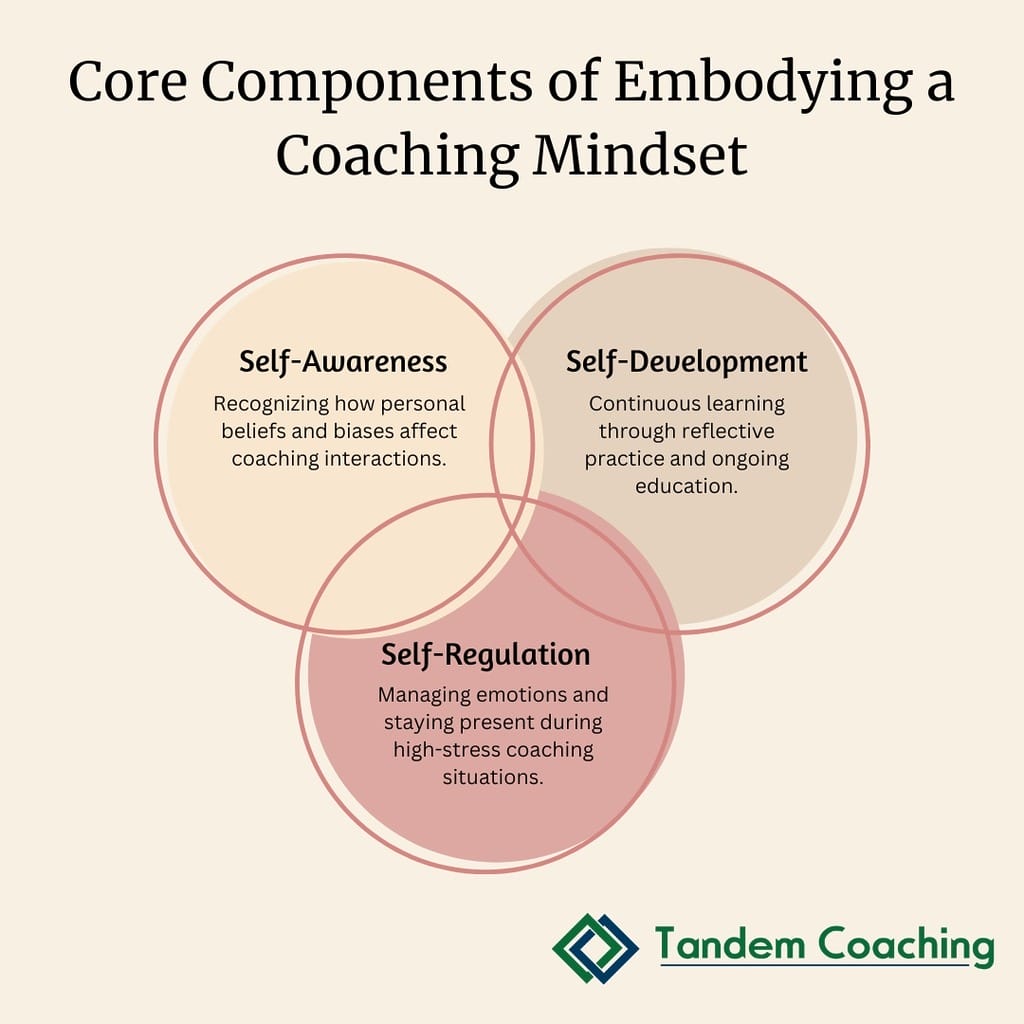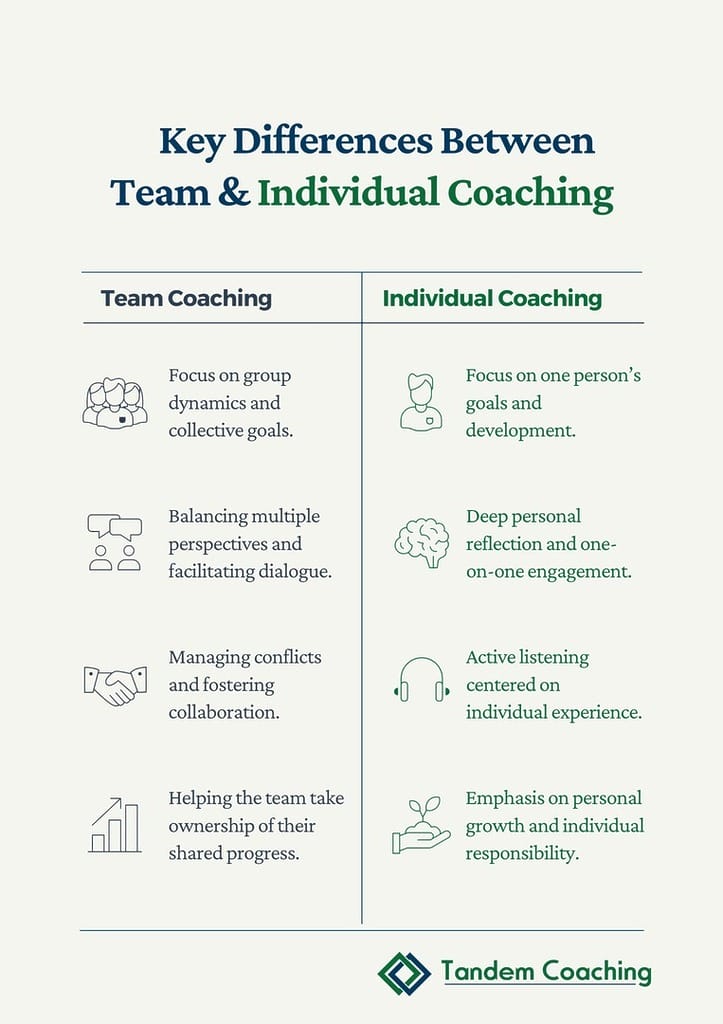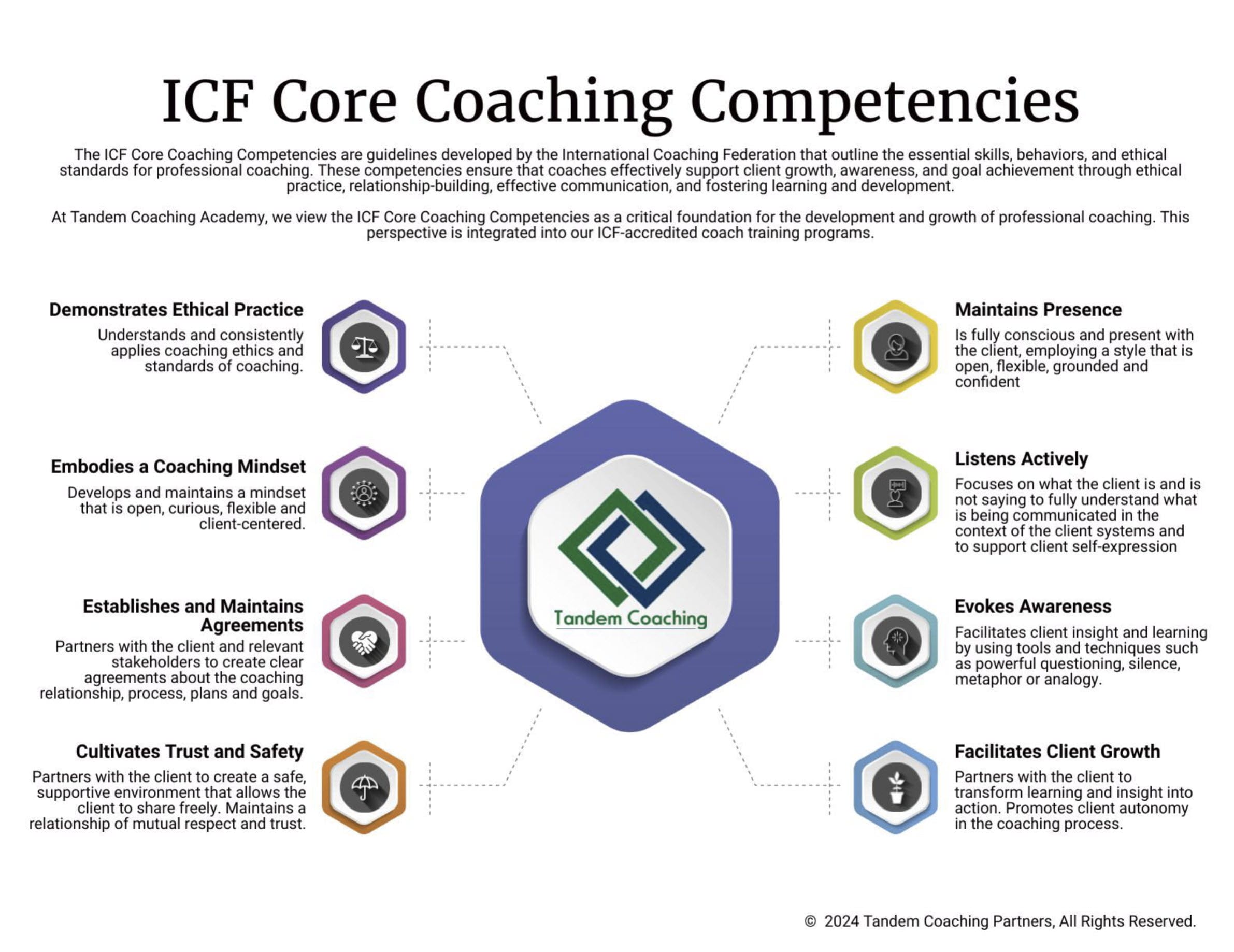Developing the right mindset is essential for effective team coaching. As team dynamics become more intricate, coaches need more than just techniques—they need a mindset that promotes growth and collaboration. This is where the ICF Team Coaching Competencies, particularly Embodying a Coaching Mindset, come into play. This competency emphasizes staying open, curious, and focused on the client, even in difficult team interactions.
For team coaches pursuing ICF certification, mastering these competencies can elevate their approach to working with teams. But what does embodying a coaching mindset truly mean in a team context? How can you cultivate self-awareness, regulate emotions, and engage in reflective practices that lead to more effective coaching?
This article will explore the Embodying a Coaching Mindset competency in detail, focusing on key areas like self-awareness, continuous development, and emotional regulation. We’ll also provide practical tips for building a coaching mindset that strengthens team performance. Additionally, we’ll examine how ICF team coaching competencies differ from individual coaching competencies to ensure you’re prepared for the nuances of team coaching.
Whether you’re preparing for your ICF ACTC certification or looking to improve your team coaching skills, this guide will equip you with the knowledge and strategies to better support your teams.
Quick Insights: Mastering the Coaching Mindset for Teams
- Embodying a Coaching Mindset is a core ICF competency that focuses on maintaining openness, curiosity, and a client-centered approach during team coaching.
- Self-awareness is crucial for team coaches, helping them understand their own biases and how these might affect team dynamics.
- Ongoing self-development through reflective practice is essential for improving coaching skills and ensuring continuous growth as a coach.
- Emotional regulation enables coaches to manage their emotions effectively during sessions, creating a calm and productive environment for teams.
- Practical steps like mindfulness and supervision support the development of a strong coaching mindset that enhances team performance.
- The ICF Team Coaching Competencies differ from individual coaching competencies, focusing on managing group dynamics and fostering team collaboration.
- Coaches aiming for their ICF ACTC certification will benefit from mastering these competencies to elevate their effectiveness in team coaching.
What Does It Mean to Embody a Coaching Mindset?
Embodying a coaching mindset is more than just adopting a set of principles; it’s about how you, as a team coach, consistently show up for your clients. In the context of ICF Team Coaching Competencies, this mindset is focused on staying open, curious, and deeply centered on the team’s goals and needs. It involves maintaining flexibility in the face of challenges, showing resilience during complex team dynamics, and encouraging a space where every team member can contribute.
For example, a coach working with a team at Empower Healthcare Network encountered resistance when team members were hesitant to share their thoughts. By embodying a coaching mindset, the coach shifted the atmosphere by asking open-ended questions that encouraged dialogue, fostering a collaborative environment where trust gradually built up. This approach reflects how curiosity and openness can transform team interactions, leading to better outcomes.
“Embodying a coaching mindset is the invisible foundation upon which all successful team coaching stands. It’s not about controlling the process, but about nurturing growth by guiding the team toward self-discovery and collective success.”
The importance of this mindset cannot be overstated. Without it, coaches risk falling into a more directive or authoritative approach, which can stifle team growth. By contrast, staying open to the team’s unique dynamics and using reflective practice to guide your actions allows for more authentic engagement with team members. The ICF stresses this competency as one of the cornerstones of effective coaching, both for individual and team settings, but especially in the context of team coaching, where dynamics are more fluid and complex.
For a deeper exploration of how to develop a coaching mindset, Tandem Coaching offers resources and training programs designed to strengthen your skills as a coach. By focusing on the core ICF Team Coaching Competencies, you can cultivate the right mindset to enhance your effectiveness with teams. Explore more on Tandem Coaching’s competencies to see how these principles can transform your coaching approach.
Why It’s Critical for Team Coaching Success
The success of team coaching relies heavily on the coach’s ability to embody a coaching mindset. In a team setting, dynamics can be complex, with communication issues, differing goals, and interpersonal conflicts all affecting progress. Coaches who approach these challenges with curiosity, openness, and flexibility are better equipped to guide teams through them.
For example, when a team struggles with unclear communication or conflicting priorities, a coach embodying this mindset focuses on creating an environment where every team member feels safe to express themselves. Rather than offering quick fixes, the coach asks thoughtful questions and encourages reflection, allowing the team to uncover their own solutions. This not only builds trust but also empowers the team to take ownership of their collective progress.
“Success in team coaching comes from guiding the team without imposing solutions—letting the team discover its own strengths and potential.”
This mindset is crucial because it ensures the coaching process remains centered on the team’s needs, not the coach’s agenda. By focusing on facilitating rather than directing, the coach fosters an atmosphere of collaboration and growth. According to the ICF Core Competencies, embodying a coaching mindset is foundational to effective team coaching, helping the coach maintain neutrality while empowering teams to succeed.
For those pursuing the ICF ACTC certification, mastering this competency can significantly enhance your effectiveness with teams. Learn more about how to develop this mindset through Tandem Coaching’s programs.

Core Components of Embodying a Coaching Mindset in Team Coaching
Embodying a coaching mindset in team coaching requires more than just adopting a few strategies—it involves a holistic approach that incorporates self-awareness, self-development, and self-regulation. These core components are crucial for maintaining the openness, curiosity, and flexibility needed to guide teams effectively.
Self-Awareness
Self-awareness is the foundation of any successful coach. It requires the coach to understand how their own beliefs, biases, and experiences might influence their interactions with the team. In team coaching, this becomes even more important as team dynamics can amplify or mask certain behaviors. By being self-aware, a coach can ensure they are not projecting their own issues onto the team or allowing personal biases to cloud their judgment.
For instance, a coach might recognize that they have a natural tendency to favor more vocal team members. With heightened self-awareness, they can actively work to ensure that quieter members are equally encouraged to contribute. This balance is key in promoting a truly collaborative environment where all voices are heard. As the ICF Competencies outline, self-awareness allows coaches to recognize how their own background and assumptions may impact the team coaching process.
Self-Development
Continuous learning and self-development are essential to staying effective as a team coach. The field of coaching is constantly evolving, and those who commit to lifelong learning are better equipped to bring fresh perspectives to their clients. Self-development can take many forms, from formal training programs to reflective practice after coaching sessions. Reflecting on what went well and where improvements can be made allows coaches to continuously refine their approach.
The ICF Core Competencies emphasize the need for coaches to engage in reflective practice, not only to improve their skills but also to deepen their understanding of team dynamics. This reflective practice is what allows coaches to develop the intuition needed to navigate complex team environments with greater ease.
Self-Regulation
Team coaching can be emotionally intense, and self-regulation is vital for coaches to remain present and effective. Coaches must be able to manage their own emotions, especially in high-stress situations, to ensure that the focus remains on the team. This is where techniques like mindfulness and emotional preparation come into play.
For example, a coach might use mindfulness practices to center themselves before a challenging session. This allows them to enter the session with clarity and calm, ready to respond to whatever the team presents without being reactive. Managing emotional responses in this way ensures that the coach remains fully focused on the team’s needs rather than being influenced by their own internal reactions. Self-regulation is not just about controlling emotions but about understanding and leveraging them to facilitate better outcomes for the team.
“A coach’s ability to manage their emotions during difficult moments directly influences the team’s ability to trust and open up, fostering a safe space for exploration.”
Building a Coaching Mindset for Team Coaching: Practical Steps
Embodying a coaching mindset is not something that happens overnight. It’s a practice that requires conscious effort, reflection, and an ongoing commitment to personal growth. Fortunately, there are several practical steps that can help you build and maintain this mindset in a team coaching environment.
Incorporating Mindfulness into Team Coaching
One of the most effective ways to maintain a coaching mindset is through mindfulness. In team coaching, where emotions can run high and conversations can become complex, mindfulness allows you to stay present and engaged without becoming overwhelmed. Mindfulness practices help coaches regulate their emotions, focus on the present moment, and remain open to whatever arises during a session.
For example, a coach might spend a few minutes meditating or practicing deep breathing before a session to clear their mind and prepare themselves mentally. This can make a significant difference in how the session unfolds, enabling the coach to stay grounded and responsive, even when team dynamics become challenging. Incorporating mindfulness regularly not only benefits the coach but also sets a calm, focused tone for the entire team.
Mindfulness is closely tied to emotional regulation, a key component of ICF Team Coaching Competencies. By managing your own emotional responses, you are better equipped to support the team through their own emotional processes. As ICF research highlights, mental well-being is critical for maintaining effectiveness as a coach.
Leveraging Supervision and Peer Support
Another practical step is seeking supervision and engaging in peer support. Supervision offers a structured space for reflecting on your coaching practice, receiving feedback, and gaining insights that help you improve. In team coaching, where the dynamics are more complex than individual coaching, supervision can be particularly valuable in helping you navigate difficult team situations and refine your approach.
Peer support is equally important. Regularly engaging with other coaches allows you to share experiences, exchange ideas, and learn from each other’s challenges and successes. Peer groups often provide a safe environment for discussing difficult coaching scenarios, helping you gain new perspectives on how to handle them.
Both supervision and peer support are integral to ongoing professional development. They reinforce the reflective practices essential to embodying a coaching mindset, as outlined in the ICF Core Competencies. Reflective practice is not a one-time activity but an ongoing process that allows coaches to deepen their understanding and enhance their skills. Learn more about the importance of reflective practice and support systems.

Discover ICF PCC and ICF ACTC Team Coaching Competencies and Mastery
Are you eager to magnify the impact of your coaching practice?
Our ICF Team Competencies program offers a seamless transition for those who have mastered the core competencies, allowing you to delve deeper into the complexities and rewards of team coaching.
Explore this opportunity today.
The Impact of Embodying a Coaching Mindset on Teams
When a coach truly embodies a coaching mindset, the effects on team dynamics can be profound. Teams often face challenges such as unclear goals, miscommunication, or interpersonal conflicts. A coach who approaches these situations with openness, curiosity, and emotional regulation can facilitate meaningful change, turning obstacles into opportunities for growth.
Enhancing Team Dynamics
One of the key benefits of embodying a coaching mindset is the ability to enhance team dynamics. By fostering a non-judgmental, open environment, coaches help team members feel safe to express their concerns, ideas, and emotions. This creates a foundation of trust, which is essential for any team to function effectively. Coaches who consistently model curiosity and flexibility show the team how to approach their challenges in a constructive way.
For example, when a team encounters a breakdown in communication, a coach can encourage open dialogue by asking reflective questions. Rather than stepping in to provide answers, the coach helps team members uncover the underlying issues and work toward their own solutions. This process builds both individual and collective accountability, making the team more resilient in the long run.
Research from the ICF supports the idea that a coach’s presence and mindset can significantly influence team performance. Teams that feel supported by a coach who embodies a client-centered, flexible approach are more likely to navigate their challenges with confidence and creativity.
Empowering Team Members for Growth
A coach who embodies a coaching mindset shifts the responsibility for growth and progress to the team itself. Instead of positioning themselves as the authority or problem-solver, the coach acts as a facilitator, guiding the team to take ownership of their development. This empowerment is key to creating long-lasting results, as the team learns to rely on its own strengths and abilities.
“Empowering teams means helping them discover their own potential, rather than simply offering solutions.”
This approach also helps individual team members develop greater self-awareness. As they engage in the coaching process, they start to see how their actions and communication affect the group. This heightened awareness allows them to adjust their behavior in a way that benefits the entire team. In turn, the team becomes more cohesive and effective in achieving its collective goals.
Challenges Team Coaches Face in Embodying a Coaching Mindset
While embodying a coaching mindset is crucial for team coaching success, it’s not without its challenges. Coaches often find themselves navigating complex team dynamics, managing personal biases, and balancing emotional investment with professionalism. Recognizing and overcoming these challenges is essential for maintaining effectiveness as a coach.
Navigating Personal and Cultural Biases
Team coaches often work with groups of individuals from diverse backgrounds, each bringing their own perspectives and cultural influences. A coach’s ability to stay neutral and not let personal biases affect their facilitation is vital. However, it’s easier said than done. Even the most self-aware coaches can unintentionally project their own assumptions onto the team. This can skew the coaching process and lead to ineffective outcomes.
To overcome this, team coaches must consistently engage in self-reflection and seek feedback from peers or supervisors. By acknowledging that biases exist, coaches can actively work to minimize their influence during sessions. According to the ICF Core Competencies, a key element of effective coaching is understanding and integrating the cultural and contextual backgrounds of all team members, ensuring that the coaching process is inclusive and equitable.
Balancing Emotional Investment with Professionalism
Team coaching often involves high emotions, especially when teams are facing conflict or navigating significant changes. As a coach, it’s easy to become emotionally invested in the team’s journey. While empathy is an important quality, too much emotional involvement can cloud judgment and interfere with the coach’s ability to remain objective.
For example, if a coach becomes overly aligned with one member of the team or a particular subgroup, it can lead to favoritism, whether intentional or not. This imbalance may create trust issues within the team. Coaches need to practice self-regulation, as emphasized by the ICF Team Coaching Competencies, to manage their emotions and remain neutral, even in emotionally charged situations.
“Professionalism in team coaching means maintaining empathy without losing objectivity—it’s about balancing support with neutrality.”
Regular supervision, mindfulness practices, and reflective journaling can help coaches stay grounded and avoid over-identifying with the team’s emotional landscape. By maintaining this balance, the coach can support the team more effectively, creating a safe space for all members to contribute.
For coaches working toward their ICF ACTC certification, overcoming these challenges is crucial to developing a sustainable coaching practice.
The Role of Self-Care in Maintaining a Coaching Mindset for Teams
Coaching, particularly team coaching, is a mentally and emotionally demanding profession. Without proper self-care, coaches can quickly become drained, compromising their ability to maintain the openness, curiosity, and presence required to embody a coaching mindset. Self-care is not just a luxury for coaches—it’s a necessity.Why Self-Care is Essential for Team Coaches
Team coaching often involves dealing with high-stakes situations, unresolved conflicts, and a wide range of emotional dynamics. As a result, coaches can easily find themselves absorbing the stress and tension of the teams they work with. Over time, this can lead to burnout, negatively impacting both the coach’s well-being and the quality of their coaching.In many ways, it’s like the instructions you hear on airplanes: “Put on your own oxygen mask before assisting others.” As a coach, if you don’t take care of yourself first, you’ll struggle to fully support your team. Prioritizing self-care—through regular breaks, physical exercise, meditation, or hobbies outside of work—ensures that you have the emotional resilience and energy required to be fully present with your clients.Coaches who take care of themselves are better equipped to handle the complexities of team coaching. Emotional resilience is a key part of self-regulation, one of the core elements of the ICF Team Coaching Competencies.“Taking care of yourself as a coach means you’re better able to take care of the teams you coach. Your presence, energy, and ability to stay curious hinge on your well-being.”
Strategies for Sustainable Team Coaching
Building sustainable habits is the cornerstone of effective self-care. Time management is critical for avoiding burnout. Coaches need to create boundaries between their work and personal lives, ensuring they don’t overextend themselves. This can include setting limits on the number of sessions per day, scheduling regular time off, and delegating administrative tasks to reduce mental strain.Mindfulness practices, such as meditation or breathwork, can help coaches remain grounded. These practices reduce stress levels and enhance focus, enabling the coach to enter each session with clarity and calm.Additionally, seeking supervision or coaching for themselves provides coaches with a professional outlet for processing emotions and challenges they encounter in their work. Engaging with a peer group or mentor can provide additional support, helping them maintain a balanced and sustainable coaching practice.Understanding the Differences Between ICF Team and Individual Coaching Competencies
At first glance, team coaching and individual coaching may seem similar—they both involve guiding clients toward growth and success. However, the competencies required to coach a team effectively differ in important ways from those necessary for individual coaching. Understanding these differences is crucial for coaches, especially those working toward the ICF ACTC certification for team coaching.
Key Differences Between Team and Individual Coaching Competencies
The main difference between team and individual coaching lies in the focus. In individual coaching, the coach works one-on-one, focusing entirely on that person’s goals, challenges, and development. The sessions revolve around helping the individual reflect, plan, and act on their own objectives.
Team coaching, on the other hand, involves navigating a more complex environment. The coach isn’t just helping individuals grow—they’re working to align the entire team toward collective goals. This means the coach must focus on group dynamics, manage relationships, and ensure that the team functions as a cohesive unit. Competencies that are essential for individual coaching, such as active listening, need to be expanded in team coaching to include integrating multiple perspectives and facilitating group dialogue.
For instance, in team coaching, the coach must balance power dynamics and manage conflicts while ensuring all voices are heard. The ICF Team Coaching Competencies focus on skills like facilitating group interactions and helping the team work through their own challenges, which are less emphasized in one-on-one coaching.

Why Focus on Team Coaching Competencies?
Although individual coaching skills are important, team coaching requires a different set of abilities to effectively handle the complexities of group dynamics. Coaches must know how to foster collaboration, resolve conflicts, and guide the team toward shared goals. This balance between managing individual contributions and collective success is at the heart of team coaching.
“Coaching a team is about creating an environment where everyone can contribute while working toward a common goal.”
For coaches focusing on team coaching, these competencies are essential to making sure the entire team moves forward together.
How Tandem Coaching Supports Your ACTC Journey
Pursuing your ICF ACTC certification is a significant step in becoming a skilled team coach, and having the right support can make all the difference. Tandem Coaching is dedicated to helping coaches like you develop the competencies needed for team coaching success, offering tailored programs and resources that focus specifically on the skills highlighted in the ICF Team Coaching Competencies.Tailored Learning for Team Coaching
Tandem Coaching provides structured learning pathways designed to help coaches master the unique challenges of team coaching. Through a combination of coursework, mentorship, and reflective practice, their programs are built to address key areas such as managing team dynamics, facilitating group decision-making, and fostering collaboration within diverse teams. These competencies go beyond the scope of individual coaching, making them essential for anyone pursuing the ICF ACTC certification.Coaches enrolled in these programs benefit from hands-on experience in real-world team coaching scenarios. This practical approach ensures that you’re not just learning theory—you’re applying it in a way that directly impacts your effectiveness as a team coach.Ongoing Support and Development
In addition to the structured programs, Tandem Coaching offers ongoing support through mentorship, peer learning groups, and supervision. This ensures that your development doesn’t end with certification. The skills required to embody a coaching mindset need regular reflection and refinement, and having a community of experienced coaches to lean on can help you stay sharp and continually grow.“The journey to becoming a great team coach doesn’t stop at certification—it’s a lifelong commitment to learning and growth.”Tandem’s programs focus on building both the technical competencies of coaching and the emotional resilience required to lead teams through complex challenges. Whether you’re just starting your journey toward certification or looking to refine your skills, Tandem offers the tools and support you need to succeed.
Conclusion
Mastering the ICF Team Coaching Competencies is an essential part of becoming an effective team coach. At the heart of these competencies is Embodying a Coaching Mindset, which allows coaches to guide teams through complex dynamics with openness, curiosity, and flexibility. By focusing on self-awareness, continuous self-development, and emotional regulation, coaches can create a supportive environment where teams are empowered to achieve their collective goals.
Whether you’re navigating the intricate dynamics of a corporate team or helping a nonprofit align its leadership, the skills and mindset you develop through these competencies will have a lasting impact on the success of the teams you coach.
For coaches pursuing their ICF ACTC certification, these competencies not only meet the certification requirements but are also the key to long-term success in the field of team coaching. With the right tools, mindset, and support, you’ll be able to guide teams to greater collaboration, trust, and results.
If you’re ready to take your coaching to the next level, consider enrolling in a program that will help you master these essential competencies. Tandem Coaching offers tailored programs that focus on developing the skills you need to thrive as a team coach. It’s more than just certification—it’s about becoming the kind of coach who can transform teams and foster lasting change.
What does embodying a coaching mindset mean in team coaching?
Embodying a coaching mindset in team coaching means maintaining openness, curiosity, and flexibility when working with a team. It’s about staying neutral and client-centered, focusing on the team’s collective growth rather than imposing personal solutions. This competency helps create an environment where the team feels empowered to collaborate and solve their own challenges. Coaches pursuing the ICF ACTC certification will find this mindset essential for navigating the complexities of team dynamics. You can learn more about the importance of a coaching mindset here.
How does embodying a coaching mindset differ in team coaching compared to individual coaching?
While embodying a coaching mindset is important in both team and individual coaching, the focus shifts in team coaching. In individual coaching, the coach is primarily concerned with one person’s goals and development. However, in team coaching, the coach must balance multiple perspectives, facilitate group interactions, and help the team work toward collective goals. These differences are crucial for coaches working with teams and are a key part of the ICF Team Coaching Competencies.
Why is self-awareness important in embodying a coaching mindset?
Self-awareness is essential for coaches because it helps them recognize how their own beliefs and biases might affect their interactions with the team. In team coaching, this is especially important, as group dynamics can amplify biases and hinder the coach’s ability to remain neutral. By staying aware of these influences, coaches can create a more inclusive, equitable environment for the team. Self-awareness is one of the core components of a coaching mindset and is emphasized in ICF Core Competencies.
How can mindfulness improve my coaching mindset during team sessions?
Mindfulness helps coaches remain present and focused during team coaching sessions. When emotions run high or discussions become complicated, mindfulness practices such as deep breathing or short meditation sessions can help the coach stay grounded. This allows the coach to handle challenging team dynamics without becoming reactive. Mindfulness is closely tied to emotional regulation, another core competency in the ICF ACTC certification process, and is crucial for effective team coaching.
What role does emotional regulation play in team coaching?
Emotional regulation is critical for team coaches because it allows them to manage their emotions and stay focused on the team’s needs. Team coaching sessions can often become intense, especially when dealing with conflicts or high-stakes decisions. Coaches who can regulate their emotions are better equipped to guide the team through these moments without becoming reactive or overwhelmed. This competency ensures that the coach can maintain a safe and productive environment for the team. Learn more about how emotional regulation supports team coaching at Tandem Coaching.
What are the benefits of embodying a coaching mindset for team success?
A coach who embodies a coaching mindset creates a space where teams feel safe to share their thoughts, collaborate effectively, and find their own solutions to challenges. This leads to higher levels of trust, better communication, and more alignment within the team. In the long run, this approach fosters greater team resilience and adaptability, which are key drivers of team success. For coaches working toward the ICF ACTC certification, mastering this mindset is essential to achieving better team outcomes.
How can I incorporate reflective practice into my coaching to develop a coaching mindset?
Reflective practice is a continuous learning process where you reflect on your coaching sessions to identify what went well and what could be improved. By regularly engaging in reflective practice, you can better understand your own coaching style, how team dynamics influence your approach, and how you can enhance your effectiveness. This is a key part of self-development, which is crucial for embodying a coaching mindset. Coaches pursuing their ICF ACTC certification are encouraged to build reflective practice into their routines. Learn more about the importance of reflective practice here.
Why is supervision important in team coaching?
Supervision provides coaches with a structured space to reflect on their practice, receive feedback, and gain new insights from experienced professionals. In team coaching, where the dynamics can be particularly complex, supervision helps coaches navigate challenges such as managing group conflicts or facilitating dialogue across diverse perspectives. It’s also an opportunity for coaches to process their emotions and prevent burnout. Regular supervision is a key part of ongoing self-development for team coaches.
How do I manage my own well-being while coaching teams?
Managing your well-being is essential for maintaining the energy and presence required for team coaching. Prioritizing self-care practices such as regular breaks, mindfulness exercises, and setting clear boundaries between work and personal life can help prevent burnout. Coaches are often reminded to “put on their own oxygen mask first” before helping others—this analogy holds true in coaching as well. By taking care of yourself, you’ll be better equipped to support your teams effectively.
What practical steps can I take to embody a coaching mindset in team coaching?
To embody a coaching mindset, start by focusing on three key areas: self-awareness, self-development, and self-regulation. Practicing mindfulness, engaging in reflective practice after each session, and seeking supervision are great ways to stay grounded and continue learning. Additionally, regular self-care and emotional regulation techniques will help you stay present and maintain focus during challenging team sessions. These steps are essential to mastering the ICF Team Coaching Competencies.

Unlock Your Coaching Potential with Tandem!
Dive into the essence of effective coaching with our exclusive brochure, meticulously crafted to help you master the ICF Core Coaching Competencies.
"*" indicates required fields
About the Author
Cherie Silas, MCC
She has over 20 years of experience as a corporate leader and uses that background to partner with business executives and their leadership teams to identify and solve their most challenging people, process, and business problems in measurable ways.












